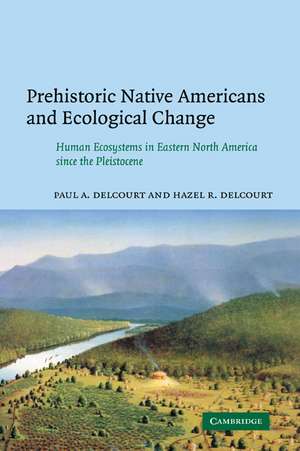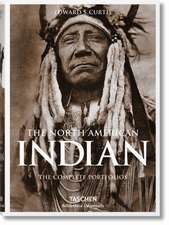Prehistoric Native Americans and Ecological Change: Human Ecosystems in Eastern North America since the Pleistocene
Autor Paul A. Delcourt, Hazel R. Delcourten Limba Engleză Paperback – 3 feb 2008
| Toate formatele și edițiile | Preț | Express |
|---|---|---|
| Paperback (1) | 388.90 lei 6-8 săpt. | |
| Cambridge University Press – 3 feb 2008 | 388.90 lei 6-8 săpt. | |
| Hardback (1) | 777.54 lei 6-8 săpt. | |
| Cambridge University Press – 28 iul 2004 | 777.54 lei 6-8 săpt. |
Preț: 388.90 lei
Nou
Puncte Express: 583
Preț estimativ în valută:
74.45€ • 76.61$ • 62.76£
74.45€ • 76.61$ • 62.76£
Carte tipărită la comandă
Livrare economică 01-15 martie
Preluare comenzi: 021 569.72.76
Specificații
ISBN-13: 9780521050760
ISBN-10: 0521050766
Pagini: 216
Ilustrații: 29 b/w illus. 1 table
Dimensiuni: 153 x 228 x 12 mm
Greutate: 0.32 kg
Editura: Cambridge University Press
Colecția Cambridge University Press
Locul publicării:Cambridge, United Kingdom
ISBN-10: 0521050766
Pagini: 216
Ilustrații: 29 b/w illus. 1 table
Dimensiuni: 153 x 228 x 12 mm
Greutate: 0.32 kg
Editura: Cambridge University Press
Colecția Cambridge University Press
Locul publicării:Cambridge, United Kingdom
Cuprins
Acknowledgements; Part I. Panarchy as an Integrative Paradigm: Overview; 1. The need for a new synthesis; 2. Panarchy theory and Quaternary ecosystems; 3. Holocene human ecosystems; Part II. Ecological Feedbacks and Processes: Overview; 4. Gene-level interactions; 5. Population-level interactions; 6. Community-level interactions; 7. Landscape-level interactions; 8. Regional-level interactions; Part III. Application and Synthesis: Overview; 9. The ecological legacy of prehistoric Native Americans; References; Index.
Recenzii
'… the book is a welcome addition to the study on human ecosystems in prehistoric times … [it] merits attention as an important study in the field of ecology and evolutionary biology.' International Studies
Notă biografică
Descriere
Demonstrates the importance of prehistoric human activities in the ecology of eastern North America, and its implications for conservation today.






